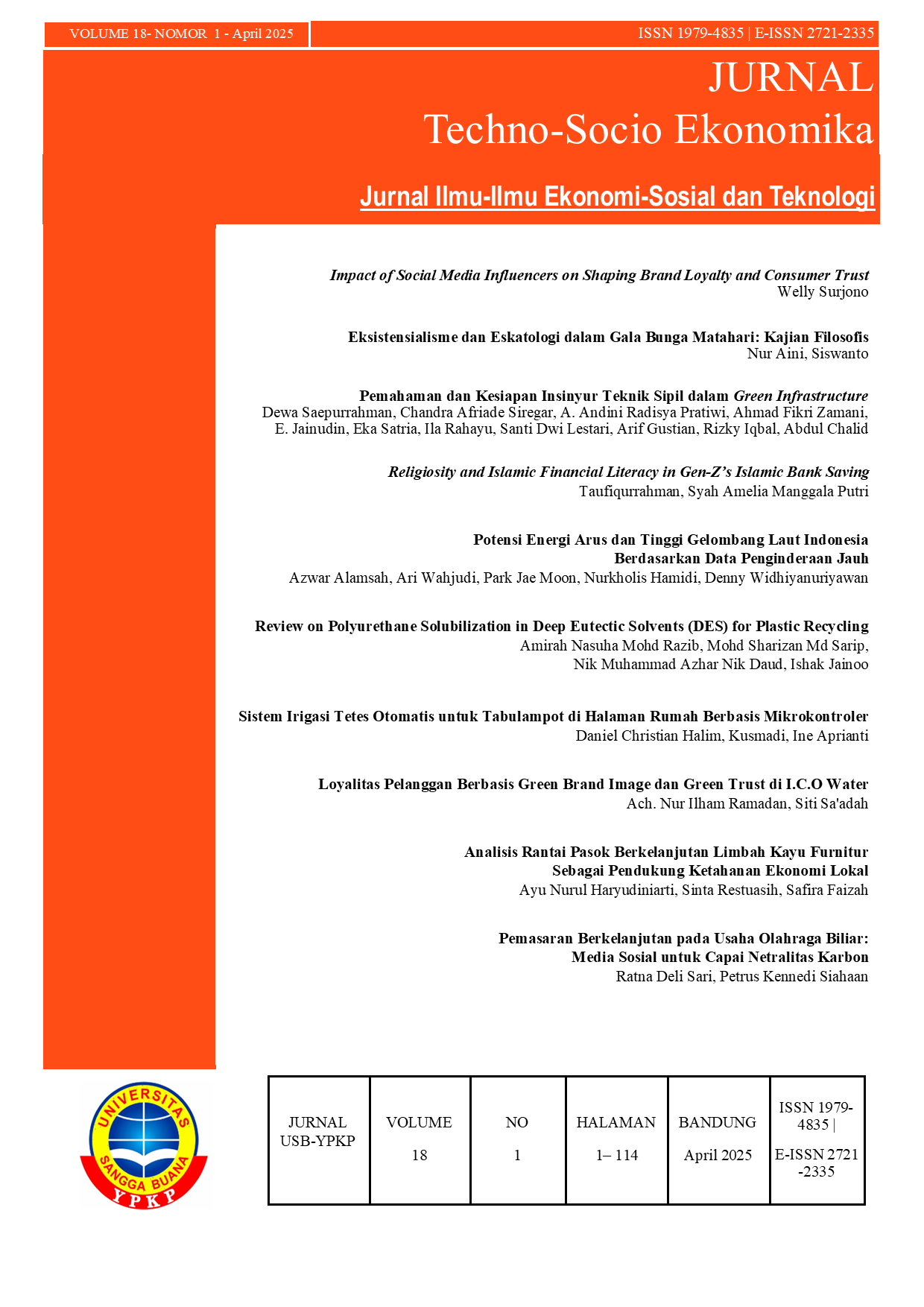Pemasaran Berkelanjutan pada Usaha Olahraga Biliar: Media Sosial untuk Capai Netralitas Karbon
Isi Artikel Utama
Abstrak
Pendekatan pemasaran yang mengutamakan keberlanjutan semakin mendapatkan perhatian, terutama dalam mendukung usaha mikro, kecil, dan menengah (UMKM) yang berkomitmen untuk mencapai netralitas karbon sebagai bentuk tanggung jawab kolektif terhadap perubahan iklim. Media sosial telah menjadi alat strategis yang efektif untuk menjangkau audiens yang lebih luas secara efisien, dengan platform seperti Instagram, Facebook, dan TikTok memberikan kesempatan untuk mempererat hubungan emosional, meningkatkan loyalitas pelanggan, serta mendukung program keberlanjutan. Fokus penelitian ini adalah PT Lucky Shot, sebuah UMKM di sektor olahraga biliar, yang menghadapi tantangan mempertahankan daya saing di pasar yang dinamis sambil menjalankan komitmen terhadap keberlanjutan lingkungan. Metode yang digunakan dalam penelitian ini adalah pendekatan deskriptif kualitatif, yang bertujuan untuk menganalisis penerapan strategi pemasaran berbasis lingkungan melalui media sosial pada PT Lucky Shot. Data diperoleh melalui kajian literatur serta pengamatan langsung terhadap aktivitas pemasaran perusahaan di media sosial. Penelitian ini menghasilkan wawasan yang mendalam mengenai pola, tantangan, dan peluang dalam mengintegrasikan strategi keberlanjutan dengan pemasaran media sosial. Studi ini dirancang untuk mengembangkan model pemasaran berbasis keberlanjutan yang dapat diterapkan, guna mendukung pencapaian target netralitas karbon sekaligus meningkatkan daya saing dan reputasi UMKM.
Rincian Artikel

Artikel ini berlisensi Creative Commons Attribution-NonCommercial-NoDerivatives 4.0 International License.
Penulis memegang hak cipta dan memberikan jurnal hak penerbitan pertama dengan karya yang dilisensikan secara bersamaan di bawah Creative Commons Attribution 4.0 International License yang memungkinkan orang lain untuk berbagi karya tersebut dengan pengakuan atas kepengarangan karya dan publikasi awal dalam jurnal ini.
Referensi
Sari RD, et al. Integrating TAM, trust and perceived risk factors on emerging-market consumers’ attitude towards shopping for Muslim fashion online. Sinergi Int J Manag Bus. 2024;2(3):148–58.
Mendrofa SA, Sari MN, Setyono BDH, Sari RD, Gusti J, Anwar DR, et al. Bisnis Startup. 1st ed. Mega Press Nusantara; 2024. Available from: https://books.google.com/books?hl=id&lr=&id=tCceEQAAQBAJ&oi=fnd&pg=PA1&dq=ratna+deli+sari&ots=pSIKX2N_uV&sig=_NNtiVreGEOEMVIqCM07YLAqxz0
Izogo EE, Mpinganjira M. Digital content marketing consumption motives in the age of social media: an investigation of relational and monetary outcomes. Aslib J Inf Manag. 2023;76(2):353–78
Bakhar M, Harto B, Gugat RMD, Hendrayani E, Setiawan Z, Surianto DF, et al. Perkembangan startup di Indonesia (Perkembangan startup di Indonesia dalam berbagai bidang). Kota Jambi: Sonpedia Publishing Indonesia; 2023. p. 1–228. Available from: https://books.google.com/books?hl=en&lr=&id=MR7eEAAAQBAJ&oi=fnd&pg=PA44&dq=pentingnya+pemahaman+terhadap+kekayaan+budaya+dalam+negeri+menjadi+lebih+kritis+karena+adanya+risiko+bahwa+%22nilai+nilai%22+budaya+daerah+dapat+terpinggirkan+oleh+arus+informasi+g
Al M, Allam M, Tobji MAB, Jallouli R, Nijholt A, Koubaa Y. Digital economy emerging technologies and business innovation/Does digital financial inclusion affect economic growth? New insights from MENA region. In: Al Mubarak AH, editor. Digital economy emerging technologies and business innovation. Vol. 325. Switzerland: Springer Nature; 2019. p. 29–40. Available from: http://link.springer.com/10.1007/978-3-319-97749-2
Ekaputra A, Sari RD, Yuniarsih Y, Algunadi M. Are digital marketing trends and challenges aligned with SDGs?: A review of Indonesian SMEs. Sinergi Int J Econ. 2024;2(2):50–61.
Trulline P. Pemasaran produk UMKM melalui media sosial dan e-commerce. J Manaj Komun. 2021;5(2):259.
Kurniawan MA, Logaiswari Indiran, Umar Haiyat Abdul Kohar. Utilization of digital marketing channels to optimize business performance among SMEs in Jakarta, Indonesia. Int J Innov Bus Strateg. 2023;18(1):16–25.
Sari RD. Analisis persepsi dan preferensi konsumen pada kualitas, kemasan, varian rasa dan merek produk kerupuk melarat di desa Belendung Karawang. J Educ. 2023;06(01):4543–51.
Sari MN, Hendriyani C, Sari RD, Angraini N, Kahar A, Abdurrahman Rahim Thaha. The Magic Of Thinking Big In Business Administration. 1st ed. Sumedang, Jawa Barat: Mega Press; 2024.
Varadarajan R, Welden RB, Arunachalam S, Haenlein M, Gupta S. Digital product innovations for the greater good and digital marketing innovations in communications and channels: evolution, emerging issues, and future research directions. Int J Res Mark. 2022;39(2):482–501. Available from: https://doi.org/10.1016/j.ijresmar.2021.09.002
Kannan D, Solanki R, Kaul A, Jha PC. Barrier analysis for carbon regulatory environmental policies implementation in manufacturing supply chains to achieve zero carbon. J Clean Prod. 2022;358:131910.
Luo B, Sun Y, Shen J, Xia L. How does green advertising skepticism on social media affect consumer intention to purchase green products? J Consum Behav. 2020;19(4):371–81.
Syed MW, Song H, Junaid M. Impact of social media technologies on environmental collaboration and green innovation: a mediation–moderation model. Kybernetes. 2024;53(1):123–51.
Kapoor KK, Tamilmani K, Rana NP, Patil P, Dwivedi YK, Nerur S. Advances in social media research: past, present, and future. Inf Syst Front. 2018;20(3):531–58.
Mishra R, Singh R, Govindan K. Net-zero economy research in the field of supply chain management: a systematic literature review and future research agenda. Int J Logist Manag. 2023;34(5):1352–97. Available from: https://doi.org/10.1108/IJLM-01-2022-0016
Ziołkowska MJ. Digital transformation and marketing activities in small and medium-sized enterprises. Sustain. 2021;13(5):2512.

